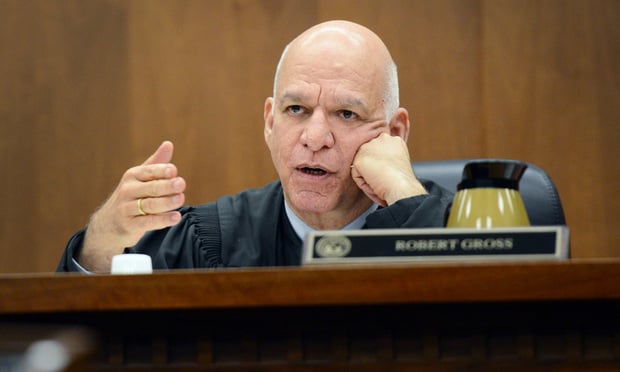South Florida Court Ruling Is a Catch-22 for Foreclosure Defendants Looking to Collect Attorney Fees
Foreclosure defendants can't have it both ways when a lender loses a foreclosure lawsuit for lack of standing.
February 12, 2018 at 01:12 PM
4 minute read
 Fourth District Court of Appeal Judge Robert Gross. Photo: Melanie Bell
Fourth District Court of Appeal Judge Robert Gross. Photo: Melanie Bell
A successful foreclosure defense strategy later proved problematic for homeowners who couldn't collect appellate attorney fees despite being the prevailing party.
Borrowers Frederick and Jonelle Sabido argued the Bank of New York Mellon lacked legal standing to foreclose on their property because it was not a signatory on the promissory note and mortgage.
But that winning argument would come back to bite them when a state appellate court didn't force the bank — which it agreed was not a party to the contracts — to pay legal fees under provisions of that same mortgage and Florida Statute Section 57.105(7), which allows winners to recoup legal expenses.
In other words: Defendants can't have it both ways.
“The borrowers' motion for fees is denied because the Bank of New York Mellon was not a party to the note and mortgage, and because the borrowers successfully argued that the Bank of New York Mellon was not entitled to enforce the instrument containing the attorney fee provision,” Fourth District Court of Appeal Judge Robert M. Gross wrote in a decision Feb. 7.
The Sabidos' attorney, Roy D. Oppenheim, suggested the ruling raised a red flag for foreclosure defense attorneys concerned they might not get paid after successfully representing clients in financial distress.
“No one ever likes to see someone do good work and not get paid,” Oppenheim said. “It basically means that any bank can bring a foreclosure, whether they have standing or not, and not worry about there being consequences for such egregious conduct. They are basically being told that they can file these willy-nilly and, within the context of the case, they will not be subject to attorneys' fees.”
The decision in the Sabido case stems from an underlying dispute in which the bank sued as successor to lender JPMorgan Chase Bank N.A. The plaintiff's case fizzled on appeal when the defendants successfully claimed the bank failed to show how the note and mortgage came into its possession.
The Sabidos signed loan documents in 2006 with Washington Mutual Bank F.A. for a condominium on Ocean Boulevard in Fort Lauderdale, according to court records. They argued Bank of New York Mellon failed to prove ownership by tracking how the debt transferred from Washington Mutual, the nation's largest savings and loan when it failed in 2008. JP Morgan Chase took over most of Washington Mutual's assets.
Foreclosure standing is a sticking point that derails lender lawsuits over questions about debt ownership. The legal question created a boon for foreclosure defense attorneys in the aftermath of the housing collapse and financial crisis when investors in the secondary debt market transferred loans so quickly and in such large quantities they sometimes left a pockmarked trail of paperwork. That paper trail — or often the lack of one — allowed borrowers to challenge plaintiffs legal standing to foreclose on mortgages.
The issue was central in the Sabido-BNY Mellon dispute with the appellate court finding in favor of the homeowners when the bank failed to establish its entitlement to enforce the note under the lost-note statute.
Oppenheim worked on the case with colleagues Geoffrey E. Sherman, Jacquelyn Trask and Yanina Zilberman of Oppenheim Pilelsky in Weston.
Lender's counsel, Elliot B. Kula, W. Aaron Daniel and William D. Mueller of Kula & Associates in Miami, did not respond to requests for comment by deadline.
This content has been archived. It is available through our partners, LexisNexis® and Bloomberg Law.
To view this content, please continue to their sites.
Not a Lexis Subscriber?
Subscribe Now
Not a Bloomberg Law Subscriber?
Subscribe Now
NOT FOR REPRINT
© 2025 ALM Global, LLC, All Rights Reserved. Request academic re-use from www.copyright.com. All other uses, submit a request to [email protected]. For more information visit Asset & Logo Licensing.
You Might Like
View All

Elite Boutiques Competing More With Big Law Bonuses, With Several Going Above Market
9 minute read

It's Time Law Firms Were Upfront About Who Their Salaried Partners Are
4 minute readTrending Stories
- 1How ‘Bilateral Tapping’ Can Help with Stress and Anxiety
- 2How Law Firms Can Make Business Services a Performance Champion
- 3'Digital Mindset': Hogan Lovells' New Global Managing Partner for Digitalization
- 4Silk Road Founder Ross Ulbricht Has New York Sentence Pardoned by Trump
- 5Settlement Allows Spouses of U.S. Citizens to Reopen Removal Proceedings
Who Got The Work
J. Brugh Lower of Gibbons has entered an appearance for industrial equipment supplier Devco Corporation in a pending trademark infringement lawsuit. The suit, accusing the defendant of selling knock-off Graco products, was filed Dec. 18 in New Jersey District Court by Rivkin Radler on behalf of Graco Inc. and Graco Minnesota. The case, assigned to U.S. District Judge Zahid N. Quraishi, is 3:24-cv-11294, Graco Inc. et al v. Devco Corporation.
Who Got The Work
Rebecca Maller-Stein and Kent A. Yalowitz of Arnold & Porter Kaye Scholer have entered their appearances for Hanaco Venture Capital and its executives, Lior Prosor and David Frankel, in a pending securities lawsuit. The action, filed on Dec. 24 in New York Southern District Court by Zell, Aron & Co. on behalf of Goldeneye Advisors, accuses the defendants of negligently and fraudulently managing the plaintiff's $1 million investment. The case, assigned to U.S. District Judge Vernon S. Broderick, is 1:24-cv-09918, Goldeneye Advisors, LLC v. Hanaco Venture Capital, Ltd. et al.
Who Got The Work
Attorneys from A&O Shearman has stepped in as defense counsel for Toronto-Dominion Bank and other defendants in a pending securities class action. The suit, filed Dec. 11 in New York Southern District Court by Bleichmar Fonti & Auld, accuses the defendants of concealing the bank's 'pervasive' deficiencies in regards to its compliance with the Bank Secrecy Act and the quality of its anti-money laundering controls. The case, assigned to U.S. District Judge Arun Subramanian, is 1:24-cv-09445, Gonzalez v. The Toronto-Dominion Bank et al.
Who Got The Work
Crown Castle International, a Pennsylvania company providing shared communications infrastructure, has turned to Luke D. Wolf of Gordon Rees Scully Mansukhani to fend off a pending breach-of-contract lawsuit. The court action, filed Nov. 25 in Michigan Eastern District Court by Hooper Hathaway PC on behalf of The Town Residences LLC, accuses Crown Castle of failing to transfer approximately $30,000 in utility payments from T-Mobile in breach of a roof-top lease and assignment agreement. The case, assigned to U.S. District Judge Susan K. Declercq, is 2:24-cv-13131, The Town Residences LLC v. T-Mobile US, Inc. et al.
Who Got The Work
Wilfred P. Coronato and Daniel M. Schwartz of McCarter & English have stepped in as defense counsel to Electrolux Home Products Inc. in a pending product liability lawsuit. The court action, filed Nov. 26 in New York Eastern District Court by Poulos Lopiccolo PC and Nagel Rice LLP on behalf of David Stern, alleges that the defendant's refrigerators’ drawers and shelving repeatedly break and fall apart within months after purchase. The case, assigned to U.S. District Judge Joan M. Azrack, is 2:24-cv-08204, Stern v. Electrolux Home Products, Inc.
Featured Firms
Law Offices of Gary Martin Hays & Associates, P.C.
(470) 294-1674
Law Offices of Mark E. Salomone
(857) 444-6468
Smith & Hassler
(713) 739-1250






